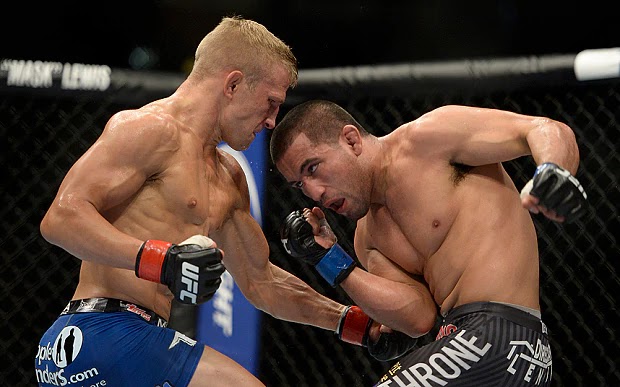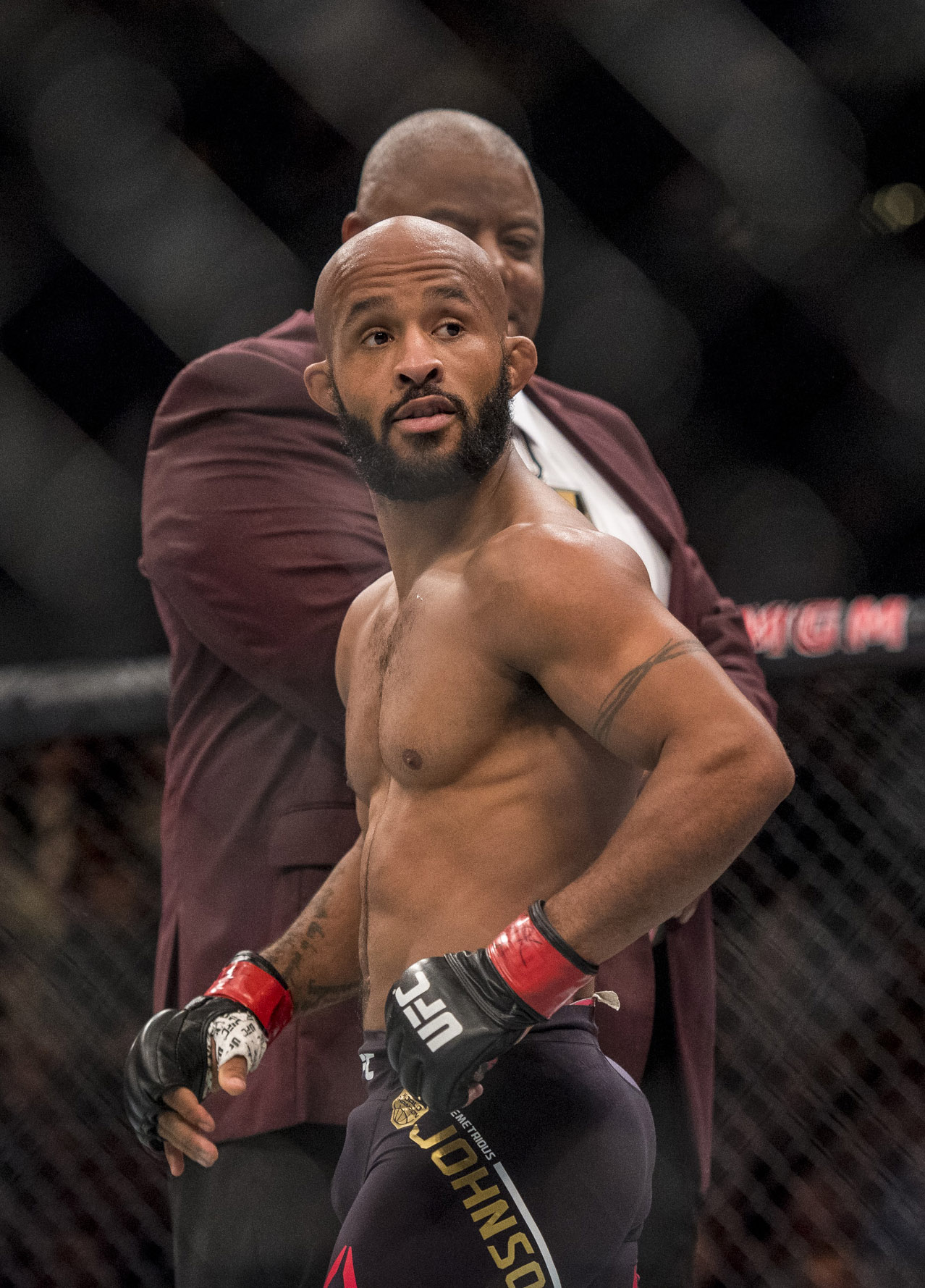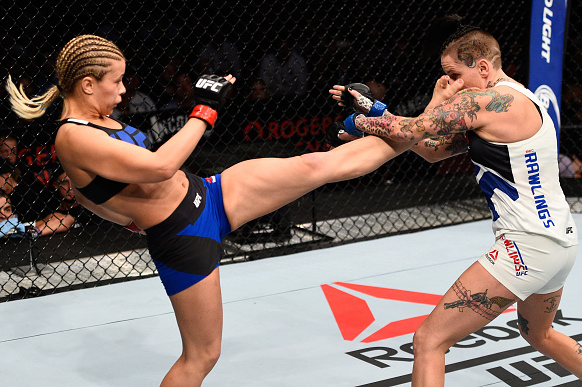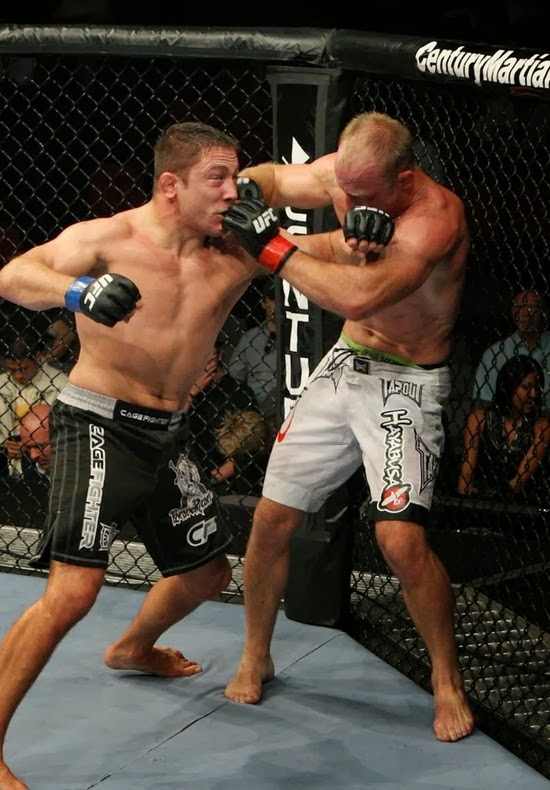Working for the UFC must be a stressful experience. Not only are many of the men and women walking into a steel cage to battle for sums of money, but what occurs outside of their workplace is starting to have a greater impact than the outcomes within it. The growing discord among many of the athletes on the UFC roster is an important development for the sport, and Demetrious Johnson’s slow turn from company man to outspoken champion is compelling to watch, as it offers a clear look at how the UFC has failed more often than it’s succeeded.
For the longest time, Johnson embodied what not only the UFC would want in a champion, but what any team or league in professional sports would. He is a family man that enjoys spending time with his wife and children while interacting with fans through video gaming. And when the time comes to compete, Johnson gets the job done; he is currently riding a 12-fight win streak that includes 10 defenses of the UFC Flyweight Championship. He has even turned up the intensity on his performances, as he’s stopped six of those ten challengers. At 30 years old, “Mighty Mouse” is in his athletic prime, and his work ethic keeps him ready to go at nearly a moment’s notice.
Factoring in all of those points, it should be clear that the UFC could build him into a star, a name that fans recognize and enjoy watching. But instead of being a “gift” to MMA, Johnson is seen as more of a “fine wine” that only the real connoisseurs of mixed martial arts enjoy. One would think that the UFC would have all the interest in the world in building him into a big name star, but recent developments seem to suggest the exact opposite.
For those unaware, one of the biggest stories in MMA this past week has been the growing battle between Johnson and the minds behind the UFC. Last Monday, Johnson joined Ariel Helwani on “The MMA Hour” and used nearly the full sixty minutes to break down the current situation he’s facing. The promotion is pushing for him to fight former UFC Bantamweight Champion T.J. Dillashaw instead of facing Ray Borg. According to Johnson, a fight with Borg was originally offered but then pulled from the table after Cody Garbrandt was forced out of his scheduled bout with Dillashaw. at UFC 213. Johnson then went on to say that this situation was created based on what Dillashaw wanted, without any regard to his views as the current flyweight champion. When Johnson refused the fight, instead wanting to chase after the record for most title defenses in UFC history, the backlash was twofold. Fans decided he was ducking Dillashaw, while UFC President Dana White used UFC media venues to denigrate the champion. Perhaps the most surprising moment of the interview came when Johnson revealed that UFC officials even threatened to end the UFC flyweight division.
Take all of that in. The UFC has one of the most dominant champions in MMA history, and instead of pushing him as such – as lord over a division – the organization is willing to shutter the weight class entirely. In a time when divisional challengers are being forced to wait and hope for opportunities for advancement, the sport has a champion that is willing to defend his crown time after time. That story alone is the starting point for promoting Johnson in a way that can draw attention to his future bouts. But instead, the company is willing to blow up the whole 125-pound division. Now Johnson is in a holding pattern, as is the rest of the division. And this is all because the organization has failed the division, and lighter weight fighters as a whole.
One thing is clear: the UFC is reluctant to put Johnson at the top of a PPV card because those events haven’t generated PPV buys. According to MMA Payout, the four events that Johnson has headlined had very bad results. UFC 174, UFC 178, UFC 186, and UFC 191 brought in 115K, 205K, 125K and 115K buys respectively. Those numbers are lower than just about any of the other events in the modern UFC era. So it’s understandable that the UFC would have reservations about putting him back in the main event spotlight. However, that doesn’t mean the company should shy away from pushing him in other ways.
Johnson has shown the ability to carry events on the various Fox platforms. When he’s used as a main event fighter for a free event, fans have shown a propensity to tune in to the show. UFC on Fox 24 stands out as the lone anomaly of a show that struggled to bring in big viewership numbers, but every other free event he’s headlined attracted an average of at least 1 million viewers, with most bringing in 2-3 million at some point during the broadcast. Those are numbers that the UFC and any broadcast venue wouldn’t scoff at. So what’s missing in terms of helping to build Johnson into the star that he should be at this point in his career?
Let’s compare Johnson to someone else who has headlined a Fox event: Paige VanZant. Career-wise, VanZant’s professional MMA run doesn’t hold up to Johnson’s. Yet that hasn’t stopped the organization from putting her in front of the masses at every available chance. Many will push the idea that the UFC considers a certain “look” more presentable to the masses than others, and VanZant (along with other women and some men) fit that mold. This translated into success when UFC on Fox 22, headlined by a matchup between VanZant and Michelle Waterson, earned a whopping 4.8 million viewers. VanZant is truly a homegrown star and a product of the UFC’s marketing power. But why doesn’t the organization use that same type of effort for athletes like Johnson that present everything the organization would want in a worker? That’s the bigger question, one that needs to be answered by the leadership within the company.
Demetrious Johnson isn’t wrong in his stance. As a contractor to the UFC, he has more control over his career than Dana White and others want fans to believe. Exercising that control is an important step for the athletes that step into the cage who are looking to leverage their strength. Secretly, all fighters should be cheering him on.







